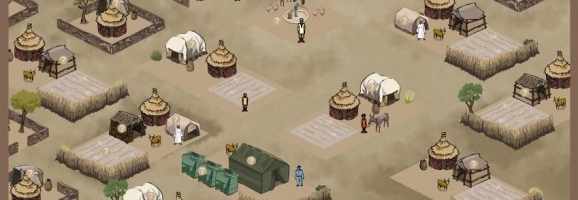Games for Change: Ludic Persuasion and Education
As the gaming world turns its attention to E3, the equally important and interesting Games for Change festival occurs from June 17-19 in New York City.
A young girl dashes across the desert plain and dives into the tall grass as a truck of Janjaweed militiamen cross the road in an old truck, rifles at the ready. As they pass by, the girl jumps from her cover and sprints towards the well in the distance, hurriedly placing down her bucket and filling it with water. The Janjaweed patrols will be back soon, so it is critical that she gets the water fast and return to camp undetected. If the militiamen catch her, then there is little chance that she will ever see her family again. When she arrives back at the crowded refugee camp, its up to her to decide how the water gets used.
The game is Darfur is Dying; a browser-based game where players are put in charge of risking their avatar’s lives retrieving water, and managing its distribution in a refugee camp. Darfur is Dying is a widely cited example from the Games for Change movement, a wave of serious, educational, and protest games seeking to promote social awareness and activism. As an intrinsically interactive medium, games are uniquely poised for persuasive content because they can demonstrate social issues and foster engagement through active play. The rise of this movement represents one of the most interesting real-world applications of games in recent memory, and presents an engaging new platform for education and expression.

Ian Bogost, professor of Media Arts at Georgia Institute of Technology, is perhaps the most well known creator of “newsgames”, socio-politically aware games that comment and educate on contemporary issues. His studio, Persuasive Games, has a partnership with the New York Times to create simple, informative games like Food Import Folly and Airport Security. Bogost states on his website: “Our games influence players to take action through gameplay. Games communicate differently than other media; they not only deliver messages, but also simulate experiences.” Games allow for players to simulate real-life situations or sympathize with the experiences of other individuals. For example, Bogost’s own Food Import Folly has players take the role of FDA inspectors screening imported food for contaminants. Reflecting real-world trends, the amount of food that the player must process increases over time, but the player’s limited personnel and resources remain ill equipped to deal with the influx of imports. Thus, the game’s mechanics metaphorically reflect real-world problems and attempt to persuade the player to a certain point of view, namely, advocacy for improved FDA funding and domestically grown food.
Peter Brinson, (who happens to be running a new Kickstarter project!) professor of procedural media at the USC Interactive Media Division, is a proponent of the “Documentary Videogame”. His 2011 PC and Mac game, The Cat and the Coup, has players assume the role of Mohammed Mossadegh’s cat. Mossadegh was Iran’s first democratically elected Prime Minister, who nationalized the country’s oil reserves, and was brought down through a CIA-engineered coup in 1951. Players solve simple puzzles as the cat to coax Mossadegh through the events that led to his downfall, and explore scrapbook-like reconstructions of Mossadegh’s life as explanatory text describes the historical events of the coup. The game achieves emotional resonance and intellectual stimulation through visuals and play, and piques interest in players in this oft-forgotten political flashpoint.
Admittedly, “newsgames” like Brinson and Bogost’s have not enjoyed the same level of mainstream fascination that traditional games have. That said, interest continues to rise as traditional news media declines in viewership. Political games from all over the ideological spectrum exist; from the left-leaning protest games of Molleindustria to the US Military’s own America’s Army. In terms of mainstream success, political games have enjoyed far more interest, especially during the 2008 US presidential election, where Republican John McCain’s campaign released Pork Invaders to Facebook, a Space Invaders-like game where players would fire cuts to eliminate waves of wasteful spending.

Games have also been used to convey radical political viewpoints, most notably, Italian culture-jamming collective Molleindustria. Molleindustria produces “homeopathic remedies to the idiocy of mainstream entertainment in the form of free, short-form, online games”, which are characterized by a punk sentiment and a guerilla aesthetic, no doubt in response to Prime Minister Silvio Berlusconi’s control of most Italian media. In Oiligarchy, players become the CEOs of oil corporations and “explore and drill around the world, corrupt politicians, stop alternative energies and increase the oil addiction”. Their 2012 Unmanned, which won the Grand Jury award at the Indiecade festival, follows the mundane life of a drone pilot as he shaves, drives to work, and plays with his kids, all whilst fighting insurgents worlds away. In their book Games of Empire, academics Nick Dyer-Witheford and Grieg de Peuter describe Molleindustria’s work, “[Molleindustria’s] tactical games are frankly didactic. Their stripped-down, graphically rudimentary production sacrifices affect for instruction. The genre teeters between brilliant ludic alienation-effects and a digital-age version of socialist realism… building ‘radical action’ in game culture requires the creation of ‘alternative algorithms’”. Molleindustria’s games thus achieve their distinctively radical voice through the reappropiation of traditional video game tropes and mechanics to convey provocative ideas.
Outside of the overtly political games of Bogost and Molleindustria, there has been a noted movement in the indie scene called “Games of Empathy”. Symptomatic of the shifts in power affecting the industry right now, individuals from marginalized populations typically create Games of Empathy, employing unusual gameplay mechanics allowing players to assume different life experiences. Anna Anthropy’s web-based Dys4ia is perhaps the most well known game from this movement (Games for Change, 2012). Dys4ia is an autobiographical game about Anthropy’s experience undergoing hormone replacement therapy, becoming transgendered, and her frustration over gender identity. It employs a series of short minigames recontextualizing classic game mechanics to describe gender frustration. Additionally, Richard Hofmeier’s IGF-winning Cart Life can be described as a poverty simulator. Players assume the role of street vendors trying to make enough money to subsist, support their families, and feed their various addictions, giving a somewhat accurate depiction of life lived day-to-day for the urban poor. These autobiographical games express the real-life stories of their authors through their mechanics and allow players to empathize with the struggles of people unlike themselves.

So why games? Film, television, web and print media have been effectively conveying persuasive ideas and encouraging citizenship for decades now. What is it about an interactive medium that puts it at an advantage over traditional media? One fundamental difference comes from how audiences engage with the medium. Video, web, and print media are passively observed, while games demand active participation. Interactivity sets games apart from other expressive media, and playing through simulated situations unlocks a wealth of new forms of intellectual engagement, most of which remain yet to be discovered. If the industry, individuals, and academia put considerable effort into coming up with new forms of serious play, then we can unlock wonderful new ways of achieving social good.
Explicitly educational games might have died out since their heyday in the early 1990s, but the Games for Change scene indicates a newfound vitality in the genre outside of the mainstream. While serious games like these were fairly underground not more than two years ago, their incredible surge with Unmanned’s Indiecade victory and Cart Life’s at the Independent Games Festival indicates that mainstream consumers are beginning to turn their attention towards these games. This owes no small part to free tools like Game Maker and Twine, which have kicked down the door to game development, allowing for an unprecedented diversity of creative voices to bubble up in the last year alone. The growing presence of the scene is exciting as it shows that games can become a viable platform for citizenship, persuasion, and education. As the mainstream game industry continues to suffer substantial losses in traditional markets, a mass exodus of developers escapes to take on independent or academic work, allowing for the kind of ludic experimentation and expression that made Darfur is Dying and Dys4ia possible.
What do you think? Leave a comment.











Oiligarchy is one of the best games I ever played. It is an intelligent game, which I believes touches many of the problems we are currently facing.
Thanks for writing this.
I think the fascination of computer games is actually they all are a simpler world than the real one. So we can dive there to release our mind a while. Games that make you want to think, also about the real world have a little double-edge problem to conquer.
However on the other hand, every, and really every scientific model is the a simplification of the real. If it would be just as complex it wouldn’t be of any value. The only question is, did developers get everything into the model that’s relevant for them or the topic…?
Time to say our farewells to the likes of E3 and welcome the creatives of the Games for Change festival.
Usually when I play experimental/art games I am left saying either “Mmm, it makes you think” or “Wow… pretentiousness overload”. Dys4ia, however, was awesome! I know a lot of t-girls and I’ve even been there to see one person start their transition and see another friend decide to undo their transition. I’m glad for the disclaimer at the start about it being a personal journey and not commentary on all transgendered people.
Once again Kevin, you’ve produced a dazzling article that raises great awareness in a worthy cause!
If the term ‘video game nerd’ was ever meant to be used as a compliment, you are the KING!
Keep up the great work, man! I love reading your articles!
Never learned about this concept of games. I’m trying to understand how they are labeled to be in this category? There are many games throughout the years that have dealt with “controversial” topics.